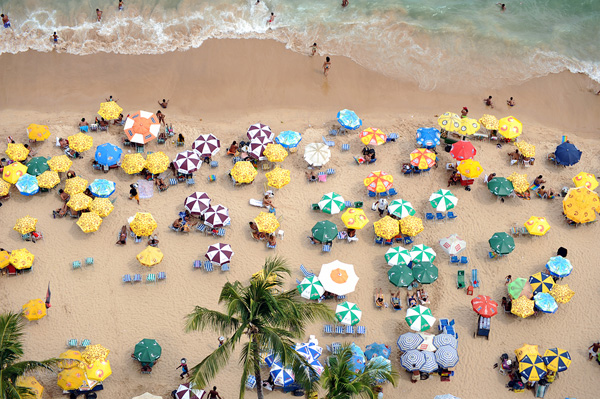How to Buy a Home in Brazil
Summary: Real Estate Brazil, Homes for Sale in Brazil The one tip that you hear expats living in Brazil repeatedly sharing with newcomers is not to buy a home when you first move to Brazil. Rent for a few months or longer so that you have time to find the right neighborhood. Give yourself time to ensure that Brazil is right for you for the long term. If you've already taken time to do those things and are ready to take the plunge and become a property owner, here are tips about buying a home in Brazil. Seasoned expatriates recommend a cautious approach to newcomers eager to settle down�avoid the rush to purchase property upon arrival. Instead, consider the benefits of renting in Brazil during your initial months. This strategy allows you the flexibility to explore various neighborhoods and truly decide if the local lifestyle aligns with your long-term expectations. Once you've acclimated and are certain that Brazil is your future home, here are tips on how to buy a home in Brazil.

Buying a home in Brazil can be an exciting prospect for expats, offering the opportunity to live in a vibrant and diverse country with a rich culture and beautiful landscapes. However, the process can be complex and challenging, particularly for those unfamiliar with the Brazilian property market and legal system. This guide aims to provide a comprehensive overview of the key aspects of buying a home in Brazil, from finding properties for sale to understanding the legal requirements and potential pitfalls.
How Do I Find Houses for Sale in Brazil?
There are several ways to find houses for sale in Brazil. Online property portals are a popular choice, offering a wide range of listings from across the country. Local newspapers and real estate agencies can also be useful resources. It's important to note that Brazil does not have a Multiple Listing Service (MLS) like in the U.S., so properties may not be listed in a centralized database. Therefore, it's often beneficial to work with a local real estate agent who has extensive knowledge of the local market.
Are There Restrictions on Foreigners Owning Property in Brazil?
Foreigners are generally allowed to own property in Brazil, with few restrictions. However, there are some exceptions, particularly for properties located in rural areas or near national borders. In these cases, ownership may be subject to approval by the Brazilian government. It's also worth noting that foreigners who own property in Brazil are required to obtain a taxpayer registry number, known as a CPF, from the Brazilian Federal Revenue.
Do Brokers Have Licenses and How Do I Know if They are Licensed?
Real estate brokers in Brazil are required to have a license issued by the Regional Council of Realtors (CRECI). This ensures that they have met the necessary qualifications and adhere to professional standards. You can verify a broker's license by checking with the CRECI in the state where the broker operates.
What Documents are Required When Buying a Home?
When buying a home in Brazil, several documents are required. These include the buyer's CPF number, proof of income, and a certificate of good standing with the credit protection service. The property itself must also have a Real Estate Registry Certificate, which confirms the current owner and any outstanding debts or liens on the property. It's also necessary to obtain a Negative Certificate of Real Estate Tax, which confirms that there are no unpaid property taxes.
Do I Need a Lawyer When Buying a Home in Brazil?
While it's not legally required to have a lawyer when buying a home in Brazil, it's highly recommended. A lawyer can help navigate the complex legal process, ensure all documents are in order, and protect your interests throughout the transaction. The cost of a lawyer can vary, but it's typically around 1-2% of the property's purchase price.
Do People Typically Buy a Property with All Cash or Take Out a Mortgage?
Both cash purchases and mortgages are common in Brazil. However, mortgages can be more difficult for foreigners to obtain, as they often require a Brazilian guarantor. Interest rates can also be high. As a result, many foreigners choose to buy property in Brazil with cash.
Are There Inspections That Take Place, and If So What is That Process Like?
Property inspections are not mandatory in Brazil, but they are highly recommended. An inspection can identify potential issues with the property, such as structural problems or legal irregularities. The process typically involves hiring a professional inspector to assess the property and provide a detailed report.
What Are Some of the Pitfalls to Avoid When Buying Property in Brazil?
There are several potential pitfalls to be aware of when buying property in Brazil. These include failing to thoroughly check the property's legal status, not obtaining a proper property inspection, and not fully understanding the terms of the contract. It's also important to be aware of potential scams, such as properties being sold by individuals who do not actually own them. Working with a reputable real estate agent and lawyer can help mitigate these risks.
Expats Talk about Real Estate in Brazil
"I am sorry to say that after 14 years in Brazil my advise would be don't move, please reconsider. As my dentist (Brazilian) recently said, "Sao Paulo is a cruel city". I hear his comments with a heavy heart. I have grown to love Brazil but the prices, lack of infrastructure, noise, traffic and now protests and violence have taken their toll," said one expat living in Sao Paulo.
"Do lots of research as it is available on line. Include in your research a local attorney who speaks English and is a member of either Briton's legal Bar Association or the ABA in the States. It is always nice when the local attorney is licensed in one of those countries because unethical practices could get them barred. With their membership in one of the Bar Associations there should be available info on whether any complaints have been filed against them in the past. These local attorneys act very much like the Title companies in the States. They do all the research to ensure free and clear property and titles. Make sure that you visit the area and the home to ensure it is what you hoped it to be. I would also recommend staying at least 2 weeks and spend time knowing the area. THE MOVE: Moving from the UK or USA is probably not a big deal. However, to get your household goods into Brazil.....well that's another matter. For instance, the USA moving company needs a 3rd party in Brazil to facilitate receiving your container and moving it to your new home. They will need paperwork that to us seems highly unusual and bureaucratic. Brazil is after all a highly bureaucratic place to live and if you haven't lived here then your in for a surprise. One of the documents that I needed was my original boarding pass from the airline that I flew from Miami to Recife. The 3rd party Brazilian company stated that without the boarding pass to prove how I arrived in Brazil then the container could not be received in Brazil (my federally stamped passport and my federally stamped Entry Card does not count). The boarding pass along with a number of other paperwork had to be notarized at one of the local Cartarios and returned to the 3rd party company. It will require several hours of standing in line to get 5 minutes of work completed. If your moving to Brazil this is how they do things and all the complaining from me or you will not change it. With all this said, I will say now that after all the standing in line waiting, jumping through hoops and getting mad, after returning home to our villa and seeing the sunset from our roof top........PRICELESS," wrote a member in Praia de Pipa.
"The south of Brazil is completely different. I lived in Balneário camboriu for one year and I loved it so much that I decided not to live in Europe and I will live down the south of Brazil. We might live in Balneário camboriu or Floripa or another city. We work online so we can move around until we decide. I can go for walks on my own at night at 9pm, 10pm, 11pm and there's lots of people around. Santa Cararina in general is an amazing place. A lot cheaper than Europe and the US and the conversion rate is better for us right now," commented one expat who made the move to Brazil.
"Brazil is a very big country, with many beautiful places, all having their advantages and disadvantage. Violence and lack of infrastructure are very common in many big cities. If you are looking for someone safe and well developed, move to Santa Catarina. Florianópolis, Camboriu, Itapema, Porto Belo for example are fantastic places to live. They feel more European, it's safe to live there and the infrastructure is good. Get in contact if I can do more to help," remarked one expat living in Brazil.
"Foreign citizens may own any type or size of urban property in Brazil, and there is no restriction on the amount. However, when buying rural land, a foreign citizen must meet certain size restrictions. The municipality in which the land is located will determine the size allowed. Some registries may also require foreign citizens to obtain a Brazilian ID card known as RNM to allow a new title to be issued on their names. ," wrote Luciano Oliveira from Oliveira Lawyers.
Luciano Oliveira is an attorney licensed in Brazil, Texas, and California. Luciano has worked with hundreds of foreign citizens like you to help them make the most of their plans for Brazil.
Click connect to have our partner, Luciano, contact you via e-mail and/or phone.
Luciano Oliveira is an attorney licensed in Brazil, Texas, and California. Luciano has worked with hundreds of foreign citizens like you to help them make the most of their plans for Brazil.
Click connect to have our partner, Luciano, contact you via e-mail and/or phone.
About the Author
 Joshua Wood, LPC joined Expat Exchange in 2000 and serves as one of its Co-Presidents. He is also one of the Founders of Digital Nomad Exchange. Prior to Expat Exchange, Joshua worked for NBC Cable (MSNBC and CNBC
Primetime). Joshua has a BA from Syracuse and a Master's in Clinical and Counseling Psychology from Fairleigh Dickinson University. Mr. Wood is also a licensed counselor and psychotherapist.
Joshua Wood, LPC joined Expat Exchange in 2000 and serves as one of its Co-Presidents. He is also one of the Founders of Digital Nomad Exchange. Prior to Expat Exchange, Joshua worked for NBC Cable (MSNBC and CNBC
Primetime). Joshua has a BA from Syracuse and a Master's in Clinical and Counseling Psychology from Fairleigh Dickinson University. Mr. Wood is also a licensed counselor and psychotherapist.
Some of Joshua's articles include Pros and Cons of Living in Portugal, 10 Best Places to Live in Ireland and Pros and Cons of Living in Uruguay. Connect with Joshua on LinkedIn.
Additional Information:
- Brazil Guide
- Healthcare & Health Insurance in Brazil
- Members Talk about Healthcare & Health Insurance in Brazil
- Best Places to Live in Brazil
- Real Estate in Brazil
- Guide to Real Estate in Brazil
- Pros & Cons of Living in Brazil
- Cost of Living in Brazil
- Guide to Residency in Brazil
- Healthcare in Brazil
- 2025 Guide to Living in Brazil
- Pros and Cons of Living in Brazil 2025




